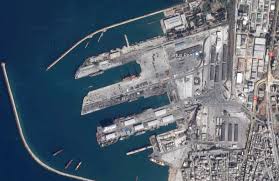Transport Minister, Ali Hammoud, denied reports on social media that Tartous port was being rented or bartered away with the Russians, saying that the investment contract was for a partnership in administering, expanding and operating the Tartous port, according to the regulations used for partnerships between the public and private sector in Syria, and that it would be signed by the private Russian Stroytransgaz company.
Hammoud told Al-Watan that the contract period had been set at 49 years because according to the economic feasibility study the project needed this long to achieve the necessary profits for both sides. The project includes an expansion north of the port in addition to all development works in the port and updating the current infrastructure and establishing a new port, whereby production will increase from its current capacity of four million tons up to 38 million tons annually, at an estimated cost of more than 500 million dollars. He noted that, based on the Syrian side’s request, the new port will be completed according to the most up-to-date global standards and with the highest level of modern technology and advanced administration systems, which will reduce many expenses.
Hammoud said that the port investment was included in the Joint Syrian-Russian Cooperation Committee protocol, and that contracting with the Russians was economically feasible.
The Minister for Transport said that this investment would help break the blockade and reduce the oppressive sanctions, and said: “The presence of a global company invested in the port will create a positive atmosphere for global shipping and encourage them to use the harbor, which will reduce the effects of the oppressive blockade imposed on Syria and help deliver needs and necessities to the Syrian people.”
He continued: “The Syrian side’s requests were met in the agreement, most importantly the workers and that they be maintained, in addition to arbitration being in Syrian courts and through the Syrian administrative judiciary.” He added that the contract terms were firm and that its items included implementation according to a specific time program.
Hammoud noted that any acquisition by the Syrian Arab Republic would be carried out in accordance with the Syrian acquisitions law and according to need, which includes the rights of citizens.
Hammoud pointed to the possibility of generalizing this experience to other Syrian ports, making them competitive with other ports in neighboring countries and the region (Mersin, Tripoli, Aqaba). He said that the increase of depth to 19 meters meant that large ships could enter with high loads, where as current tonnage is no more than 30,000 tons. The current depth is between four and 13 meters and after the expansion it will see two million containers annually. He noted that the port now receives about 20,000 containers annually, which means an increase tens of times over.
He said: “We had a previous experience in administering the container station in the Tartous port with a Philipino company, and now the administration in the container station of the Lattakia port by a joint Syrian-French company. The experience is not new, as most global strategic projects, especially ports, are administered by specialized companies and not alone, which achieves greater profits and returns.” He added: “Work and efforts are continuing with determination and persistence across dozens of major projects offered for investment, including setting up airports, rail lines and establishing naval industrial zones.”
Hammoud added that the investment would activate land transport and the rail sector and that it would return life to it by transporting goods, whether to internal markets or through transit, with rail lines rehabilitated as well as main roads that connect the port with neighboring countries. A project linking the Syrian coast with Iraq and the Gulf will be completed, with important advantages for the New Silk Road crossing through Syria, as well as completing the dry port supporting the work of the naval port, and strengthening the work of the dry ports in the provinces.
He continued: “We are able to benefit from Russian relations with various countries, especially neighboring countries and to benefit from major commercial realtions through our Russian friends, especially in exporting vegetables, fruits and citrus to various countries by way of establishing a packing and sorting center, and a distribution center for Russian wheat in the region, and launching pioneering projects established to attract new investments to encourage local and foreign companies to invest, especially in light of the economic blockade.”
This article was translated and edited by The Syrian Observer. Responsibility for the information and views set out in this article lies entirely with the author.


